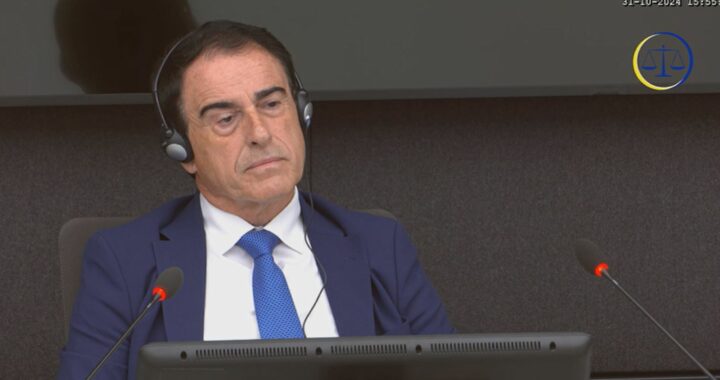

 Nuredin Ibishi at the Kosovo Specialist Chambers in the Hague, Photo: Livestream/Kosovo Specialist Chambers
Nuredin Ibishi at the Kosovo Specialist Chambers in the Hague, Photo: Livestream/Kosovo Specialist Chambers
Nuredin Ibishi told the Hague court that collaborators with Serbia's regime had to be detained, as the information that flowed from them had 'severe consequences' for the KLA
Nuredin Ibishi, a former member of the Kosovo Liberation Army, KLA, has told the war crimes and crimes against humanity trial of former Kosovo President Hashim Thaci and three other former guerrillas that detaining collaborators was necessary to avoid “severe” consequences.
“The consequences [of the actions of collaborators with Serbia] were severe, which is why we had to take action in the absence of a judicial system,” Ibishi told the Hague court on his last day of testimony on Thursday.
On October 24, Ibishi told the court that “the information that flowed from these collaborators was reflected in consequences for the KLA. We had to take measures to protect the mission … but also to protect the civilians who supported us in our mission”. He explained that KLA members had been murdered or disappeared because of such collaborators.
Ibishi was responsible for the recruitment and training of KLA soldiers. He held different positions, including commander of Brigade 131 and, after December 1998, Chief of the General Staff of the Llap Operational Zone.
On Thursday, under questioning by the judges, he said each village had a civil protection unit which was responsible for care of the civilian population. He explained that the KLA’s ‘operational zones’ and their commands did not know who the collaborators were, but the civilian population often identified them via the civil protection unit, which would then notify the brigade in the region.
“They were sent to custody through the military police in that area. They were informed of the reason for their detention and, when it ended, were released,” Ibishi said, explaining that usually release followed an assurance that collaboration would not continue.
Ibishi was based in the village of Bajgore from at least August to September 1998. He confirmed that collaborators were held in Bajgore even before the KLA General Staff issued communiques on the matter, because detentions started in August 1998 and the KLA communiques came months later.
On October 24, during questioning by Thaci’s lawyer, Luka Misetic, Ibishi insisted that collaborators were not punished in response to the KLA communique 53, dated September 22, 1998, which said “punitive actions will be taken against collaborators who serve the invaders”, or communique 54, from September 24, 1998, which complained about “political collaborationists and collaborators who propagandise against the KLA”.
The prosecution is seeking to prove that top KLA officials, like the defendants, were responsible for crimes committed by lower-ranking fighters.
Defendants Thaci, Jakup Krasniqi, Rexhep Selimi and Kadri Veseli are accused of having individual and command responsibility for crimes committed against prisoners held at KLA detention facilities in Kosovo and Albania, including 102 murders.
The crimes were allegedly committed between at least March 1998 and September 1999, during and just after the war in Kosovo. The defendants have pleaded not guilty.
According to the indictment, Thaci and his co-defendants “shared the common purpose to gain and exercise control over all of Kosovo by means including unlawfully intimidating, mistreating, committing violence against, and removing those deemed to be opponents”.
These opponents included collaborators or those perceived as collaborating with Yugoslav forces or Serbian authorities, or who did not support the goals of the KLA. These included members of the Democratic League of Kosovo, LDK, as well as Serbs, Roma and other ethnic groups.
The defence has been trying to prove that the KLA did not have a proper army command structure, so the defendants could not be held responsible for crimes committed by fighters in the field.
Ibishi told the court that, during the war, he met Krasniqi, who was the KLA’s spokesperson. He said he had assumed that Selimi and Thaci were members of the KLA General Staff but had not known for sure. He claimed he never met Veseli during the war.
Referring to one of the named victims in the trial, Milevan Stankovic, he told the court that he was detained because he had attacked KLA positions in Potok.
“When an armed person enters the security perimeter, what should be done with him? Should he be ‘petted’?” Ibishi asked. “The person attacked our positions in Potok, armed. He was arrested in flagrante delicto.”
Stankovic, a forest guard, was arrested on August 2, 1998. Ibishi was present during the arrest.
On October 23, Ibishi told the court that forest guards and those who cut wood illegally were often suspected of being collaborators because the Serbian authorities would provide trade permits for useful information.
01 November 2024 - 14:13

At the close of their trial in The Hague, the four former Kosovo Liber...

On the 18th anniversary of the independence of Kosovo, thousands of ci...

The defence for the four former Kosovo Liberation Army leaders said in...

MPs in both Kosovo and Albania on Thursday adopted declarations in sup...